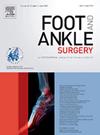Factors influencing the speed of correction speed of distal tibial valgus deformity in children with percutaneous epiphyseodesis using transphyseal screw
IF 1.9
3区 医学
Q2 ORTHOPEDICS
引用次数: 0
Abstract
Introduction
The distal tibial valgus deformity in children mimics a hindfoot valgus and is observed in several conditions of both non-neurogenic and neurogenic origin. The deformity can only be detected with radiological examination and can be safely and effectively corrected in children with medial percutaneous epiphysiodesis using transphyseal screws (PETS). The aims of the study are: 1. to determine the correction rates of the distal tibial valgus deformity due to different pathologies, 2. to examine the correction rate in relation to the age at implantation, severity of the initial deformity and the duration of implantation, 3. and types of foot deformities associated with the deformity.
Materials and methods
A retrospective study was done on children who underwent a PETS for a distal tibial valgus deformity. The lateral distal tibia angle 89° ± 3° on ankle mortice x-rays was taken as normal. An analysis of variance and covariance was done to investigate differences in parameters between aetiologies and relations between parameters respectively.
Results
Following exclusion of 191 limbs, 155 limbs in 104 children were included the study, 5 groups could be identified: Idiopathic, ICP (cerebral palsy), MMC (Meningomyelocele), Dysmelia, MHE (multiple hereditary exostosis). The mean age at implantation of all patients was 10.9 ± 1.4 years. The average correction of 0.45° ± 0.08°/month with no significant differences in the correction rates between groups. However, the correction rates were dependent on the age, the initial deformity and the duration of treatment. The incidence of a valgus foot deformity was 86.4 %.
Conclusion
The correction rates of the distal tibial valgus deformity following PETS are variable and depend, on the age at implantation, duration of treatment and initial deformity. The spectrum of foot deformities associated with distal tibial valgus deformity, especially a high prevalence of valgus foot deformity warrants an ankle mortice x-ray.
Level of Evidence
Level III, retrospective study
使用经皮骺螺钉对儿童胫骨远端外翻畸形进行矫正的速度影响因素。
导言:儿童胫骨远端外翻畸形类似于后足外翻,可在多种非神经源性和神经源性疾病中观察到。儿童胫骨远端外翻畸形只能通过放射学检查发现,使用经皮骨骺内侧螺钉(PETS)可以安全有效地矫正畸形。本研究的目的是1.确定不同病理导致的胫骨远端外翻畸形的矫正率;2.研究矫正率与植入年龄、初始畸形严重程度和植入时间的关系;3.以及与畸形相关的足部畸形类型:对因胫骨远端外翻畸形而接受 PETS 的儿童进行了一项回顾性研究。踝关节X光片上胫骨远端外侧角度为89°±3°为正常。分别进行方差分析和协方差分析,以研究不同病因之间参数的差异和参数之间的关系:在排除了 191 个肢体后,104 名儿童的 155 个肢体被纳入研究,并确定了 5 个组别:特发性、ICP(脑瘫)、MMC(脑膜瘤)、Dysmelia、MHE(多发性遗传性外骨骼发育不良)。所有患者植入时的平均年龄为(10.9 ± 1.4)岁。平均矫正率为 0.45° ± 0.08°/月,组间矫正率无明显差异。不过,矫正率与年龄、初始畸形和治疗时间长短有关。足外翻畸形的发生率为86.4%:结论:PETS术后胫骨远端外翻畸形的矫正率不尽相同,取决于植入时的年龄、治疗时间和初始畸形。与胫骨远端外翻畸形相关的足部畸形,尤其是高发的足部外翻畸形,需要进行踝关节X光检查:证据等级:三级,回顾性研究。
本文章由计算机程序翻译,如有差异,请以英文原文为准。
求助全文
约1分钟内获得全文
求助全文
来源期刊

Foot and Ankle Surgery
ORTHOPEDICS-
CiteScore
4.60
自引率
16.00%
发文量
202
期刊介绍:
Foot and Ankle Surgery is essential reading for everyone interested in the foot and ankle and its disorders. The approach is broad and includes all aspects of the subject from basic science to clinical management. Problems of both children and adults are included, as is trauma and chronic disease. Foot and Ankle Surgery is the official journal of European Foot and Ankle Society.
The aims of this journal are to promote the art and science of ankle and foot surgery, to publish peer-reviewed research articles, to provide regular reviews by acknowledged experts on common problems, and to provide a forum for discussion with letters to the Editors. Reviews of books are also published. Papers are invited for possible publication in Foot and Ankle Surgery on the understanding that the material has not been published elsewhere or accepted for publication in another journal and does not infringe prior copyright.
 求助内容:
求助内容: 应助结果提醒方式:
应助结果提醒方式:


